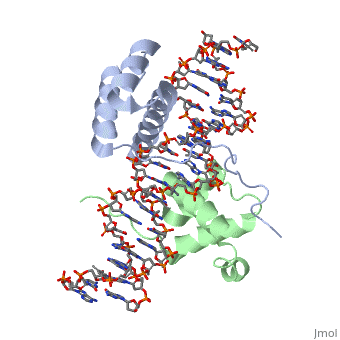1puf: Difference between revisions
No edit summary |
No edit summary |
||
| Line 1: | Line 1: | ||
[[Image:1puf. | {{Seed}} | ||
[[Image:1puf.png|left|200px]] | |||
<!-- | <!-- | ||
| Line 9: | Line 10: | ||
{{STRUCTURE_1puf| PDB=1puf | SCENE= }} | {{STRUCTURE_1puf| PDB=1puf | SCENE= }} | ||
===Crystal Structure of HoxA9 and Pbx1 homeodomains bound to DNA=== | |||
<!-- | |||
The | The line below this paragraph, {{ABSTRACT_PUBMED_12923056}}, adds the Publication Abstract to the page | ||
(as it appears on PubMed at http://www.pubmed.gov), where 12923056 is the PubMed ID number. | |||
--> | |||
{{ABSTRACT_PUBMED_12923056}} | |||
==Disease== | ==Disease== | ||
| Line 33: | Line 37: | ||
[[Category: Protein-dna complex]] | [[Category: Protein-dna complex]] | ||
[[Category: Tale homeodomain]] | [[Category: Tale homeodomain]] | ||
''Page seeded by [http://oca.weizmann.ac.il/oca OCA ] on | |||
''Page seeded by [http://oca.weizmann.ac.il/oca OCA ] on Tue Jul 29 05:49:53 2008'' | |||
Revision as of 05:50, 29 July 2008

Crystal Structure of HoxA9 and Pbx1 homeodomains bound to DNACrystal Structure of HoxA9 and Pbx1 homeodomains bound to DNA
The HOX/HOM superfamily of homeodomain proteins controls cell fate and segmental embryonic patterning by a mechanism that is conserved in all metazoans. The linear arrangement of the Hox genes on the chromosome correlates with the spatial distribution of HOX protein expression along the anterior-posterior axis of the embryo. Most HOX proteins bind DNA cooperatively with members of the PBC family of TALE-type homeodomain proteins, which includes human Pbx1. Cooperative DNA binding between HOX and PBC proteins requires a residue N-terminal to the HOX homeodomain termed the hexapeptide, which differs significantly in sequence between anterior- and posterior-regulating HOX proteins. We report here the 1.9-A-resolution structure of a posterior HOX protein, HoxA9, complexed with Pbx1 and DNA, which reveals that the posterior Hox hexapeptide adopts an altered conformation as compared with that seen in previously determined anterior HOX/PBC structures. The additional nonspecific interactions and altered DNA conformation in this structure account for the stronger DNA-binding affinity and altered specificity observed for posterior HOX proteins when compared with anterior HOX proteins. DNA-binding studies of wild-type and mutant HoxA9 and HoxB1 show residues in the N-terminal arm of the homeodomains are critical for proper DNA sequence recognition despite lack of direct contact by these residues to the DNA bases. These results help shed light on the mechanism of transcriptional regulation by HOX proteins and show how DNA-binding proteins may use indirect contacts to determine sequence specificity.
Structure of HoxA9 and Pbx1 bound to DNA: Hox hexapeptide and DNA recognition anterior to posterior., LaRonde-LeBlanc NA, Wolberger C, Genes Dev. 2003 Aug 15;17(16):2060-72. PMID:12923056
From MEDLINE®/PubMed®, a database of the U.S. National Library of Medicine.
DiseaseDisease
Known disease associated with this structure: Leukemia, acute pre-B-cell OMIM:[176310]
About this StructureAbout this Structure
1PUF is a Protein complex structure of sequences from Homo sapiens and Mus musculus. Full crystallographic information is available from OCA.
ReferenceReference
Structure of HoxA9 and Pbx1 bound to DNA: Hox hexapeptide and DNA recognition anterior to posterior., LaRonde-LeBlanc NA, Wolberger C, Genes Dev. 2003 Aug 15;17(16):2060-72. PMID:12923056
Page seeded by OCA on Tue Jul 29 05:49:53 2008

